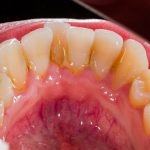Why Are My Teeth Cold-Sensitive?
When you take a sip of a cold beverage or bite into an ice cream cone, or even feel the brisk winter air on your face, what is the first thing you feel? If you say “pain,” then you might have a (totally treatable) dental issue to blame.
While you might be able to avoid frosty drinks (since, this time of year, you aren’t exactly clamoring for ice cream), you sure won’t be able to avoid the chilly Fort Worth wind that picks up at night and chills you to the bone!
Fortunately, sensitive teeth can be treated, and the condition can improve. To prevent excessive pain, give Dr. Ku a call to discuss the underlying problem.
In the meantime, we’ll walk you through what might be happening, and what could have caused it.
Ouch! Why do my teeth hurt?
Before discussing what might have been the initial cause of the pain, let’s dive into the structure of teeth to learn what’s really happening beneath the surface.
Tooth sensitivity is usually caused by dentin on root areas exposed due to receded gums or periodontal disease. When the root of a tooth becomes exposed, it does not have a layer of enamel (like the crowns of your teeth). Instead, the roots have a very soft covering called cementum, which, once lost, leaves the dentin of the root exposed.
Pain after consuming hot, cold, sweet or acidic food or drinks can also be a sign of decay or a hole in the tooth, or a sign of a broken tooth. If this is the case, your dentist will treat you with a filling or similar treatment.
What causes tooth sensitivity?
Everyone is susceptible to tooth sensitivity. At least 40 million adults suffer from sensitive teeth in the United States, according to the Academy of General Dentistry. The Cleveland Clinic highlights a handful of key factors that also contribute to tooth sensitivity, which include:
- Gum recession
- Brushing too hard or using a toothbrush with hard bristles
- Gingivitis
- Plaque buildup
- High consumption of acidic foods (that speed up enamel erosion)
- Sensitivity following a tooth whitening treatment
Can I prevent tooth sensitivity to cold?
Unfortunately, sensitive teeth never fully disappear. Symptoms can ebb and flow, but there can always be underlying pain.
Similarly, there is no single treatment option that works for all dental patients who suffer from sensitive teeth. Once your dentist diagnoses the underlying cause of the pain, he or she can tailor a treatment plan suited to fit your particular needs. Some in-office solutions include root canals, surgical gums grafts, or bonding that can cover exposed roots.
If you want to try an at-home solution first, you can try using a desensitizing toothpaste. These products help block the pain response. Fluoride treatments are another noninvasive treatment option that is applied to the teeth, helping strengthen the enamel.
To prevent sensitive teeth symptoms from recurring, brush your teeth twice a day with a soft-bristled toothbrush and fluoride toothpaste, and floss daily. Use gentle strokes when you brush, rather than vigorous or harsh scrubbing—and avoid using an abrasive toothpaste. If you grind your teeth regularly, ask your dentist about a mouth guard. Tooth grinding can fracture teeth and cause sensitivity.
If you are suffering from tooth sensitivity, call Dr. Ku’s office today!






